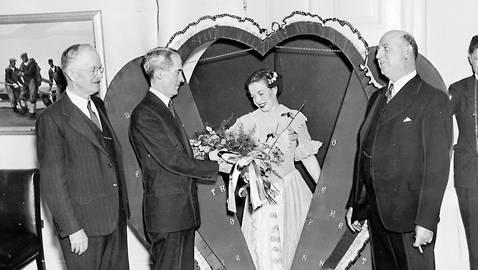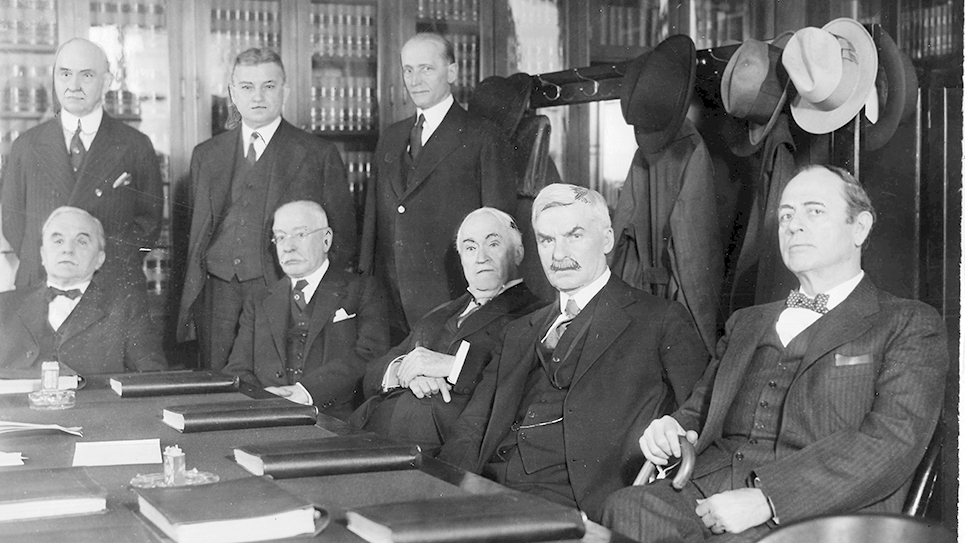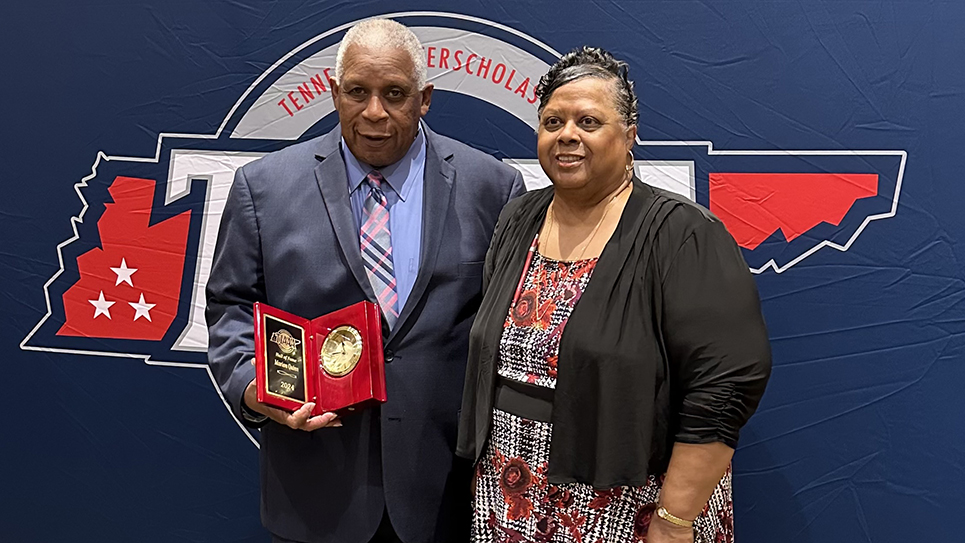
Photo from the author’s personal collection.
In 1936, Tennessee sent President Franklin Roosevelt a ‘live’ Valentine from the Fourth Congressional District. Left to right, Dr. P. A. Lyons, President of Tennessee’s State Teacher’s College, Marvin McIntyre, Secretary to FDR, Miss Florence Cox, and Congressman J. Ridley Mitchell.
Long forgotten by most, John Ridley Mitchell was a member of Congress for eight years and twice a viable candidate for statewide office in Tennessee. J. Ridley Mitchell was a formidable politician and a wily practitioner of the art of politics. Albert Gore, Sr., who succeeded Mitchell in Congress, once described his predecessor as the sort of politician who could promise every constituent a new post office and then make the person happy when the new post office never materialized.
John Ridley Mitchell was born in Livingston, Tennessee on September 26, 1877. Mitchell became involved in politics early in life and was hired as the secretary to Congressman Charles Edward Snodgrass in 1899. Ridley Mitchell remained as Snodgrass’s personal secretary throughout the latter’s four years in Congress. Congressman Snodgrass was defeated for renomination in 1902 and Mitchell had been busy working his way through law school. Mitchell graduated from the Cumberland School of Law in 1904 and settled down in Crossville to commence the practice of law.
Mitchell continued his interest in politics as a young attorney and was selected as a member of the Tennessee Democratic State Executive Committee in 1910. Mitchell had joined the staff of the attorney general for the Fifth Judicial Circuit in 1908, where he remained for the next decade. Ridley Mitchell succeeded his boss in 1918, having been elected as Attorney General for the Fifth Judicial District that same year. General Mitchell did not complete his term of office, as he ran for a higher office, becoming judge of the Fifth Judicial District in 1924, a position he held until his election to Congress in 1930.
The Congressman from Tennessee’s Fourth District was the venerable Cordell Hull. Like Mitchell, Cordell Hull had first served as a judge before winning election to Congress in 1906. By 1930, Cordell Hull was one of those rare Congressmen with a national reputation. Hull’s long tenure in Congress had been interrupted in 1920 when many Tennessee Democrats had been inundated by a Republican tidal wave of votes. Chairing the Democratic National Committee briefly while biding his time to make another campaign to return to Congress in 1922, Hull had served ever since.
Cordell Hull announced he would seek election to the United States Senate in 1930. The incumbent, wealthy Chattanooga candy maker William E. Brock, had been appointed to office following the death of Senator Lawrence D. Tyson of Knoxville. Hull, while a formidable candidate, initially drew opposition from Nashville Congressman Joseph W. Byrns, who would later serve as Speaker of the House. Byrns actually kicked off his drive for the Democratic nomination for the United States Senate, but later withdrew as he suffered a mild heart attack during his campaign kickoff. Hull was nominated easily.
With Cordell Hull leaving the House of Representatives for the United States Senate, several prominent Democrats in Tennessee’s Fourth District scrambled to compete in the primary election. J. Ridley Mitchell quickly announced his own campaign to succeed Judge Hull in Congress. Drawing two serious opponents inside the Democratic primary, Mitchell had the advantage of having been elected as both attorney general and judge from a multi-county district centered in the heart of the Fourth Congressional District.
Tall, well dressed, bald and distinguished-looking, J. Ridley Mitchell was a good speaker and an exceptional glad-handler. Mitchell demonstrated remarkable strength in winning the 1930 Democratic primary by a large margin, beating his nearest competitor by almost two-to-one. The Republicans were no longer a threat inside the Fourth District and Ridley Mitchell went to Washington, D. C.
It was a dark time, both nationally and in Tennessee. The effects of the Great Depression had permeated every segment of society, save perhaps for the most wealthy people in the country. Millions of people were out of work or worse and there were no social safety nets provided by the government. Ridley Mitchell, a bachelor at the time, worked hard at his job and tended to the needs of his constituents.
It seemed likely that Ridley Mitchell’s time in Congress would end almost as soon as it began. Following the census of 1930, Tennessee was losing a Congressional seat and Ridley Mitchell’s district was combined with that of Congressman Ewin L. Davis.
Ewin Lamar Davis had been in Congress since 1919. Representing what had been Tennessee’s Fifth Congressional District, Davis had risen through the ranks to become chairman of a House committee. Unfortunately, the Committee on Merchant Marines and Fisheries had less to do with landlocked Tennessee interests than many others. Congressmen Davis and Mitchell faced off in a fierce battle inside the Democratic primary.
Ewin Davis naturally stressed seniority, saying he could do more for the district if reelected. J. Ridley Mitchell scoffed at the notion, as all challengers do. Congressman Mitchell moved through the district steadily and having run a successful race just two years earlier, Mitchell’s organization was healthier than that of Ewin Davis who had infrequently faced opposition. The new Fourth District was a sprawling affair, comprised of seventeen counties in Middle Tennessee.
One of the issues in the hard fought primary campaign was that of nepotism. Ridley Mitchell loudly denounced the practice and Congressman Davis had apparently had two of his daughters on his Congressional payroll at one point. The House payroll accounts had only recently been opened to the press and nepotism was quite a common practice at the time and it caused several incumbents serious political problems during the 1932 election.
In the end, it proved all politics is local. Congressman Davis won the counties formerly in his old district, while J. Ridley Mitchell won every county that he had previously represented. The race was close and Ridley Mitchell won by 902 votes out of almost 40,000 ballots cast.
Defeating any long-time incumbent is never an easy feat, especially when that incumbent is not afflicted by illness or tarred by scandal. J. Ridley Mitchell had demonstrated his political prowess by winning a campaign many believed he could not win.
Following the election, Congressman Mitchell gave an interview that was carried in many newspapers across the country by the Associated Press. Mitchell admitted he was preparing for another effort to “kick kinfolks off congressional pay rolls.”
Mitchell confessed he realized his bill to prohibit Congressional nepotism was languishing in a committee, but promised he would do all he could to move it to a vote.
“A man’s duty is to give employment, so far as he is able, to the constituents who helped elect him,” Mitchell concluded.
1933 was a good time to be a Democrat. Herbert Hoover had been badly beaten in his reelection bid by New York Governor Franklin Delano Roosevelt. The Republican majorities in Congress had been replaced by a tsunami of Democrats, many of whom had ridden FDR’s coattails to win election. Ridley Mitchell returned to Congress, albeit as a junior member.
With the advent of the New Deal and a return to power of the Democrats, Congressman Mitchell lost his secretary, Hugh Davenport. Davenport had been elected Circuit Court Clerk for Putnam County when only twenty-two years old. A shrewd politician, Davenport was the beneficiary of the Democratic return to power, as he resigned from Congressman Mitchell’s staff to accept an appointment as Postmaster of Crossville, Tennessee.
Former Congressman Ewin L. Davis was similarly a beneficiary of patronage, winning an appointment to the Federal Trade Commission on May 23, 1933. Davis would remain as a Commissioner until his death on October 23, 1949.
Congressman Mitchell faced a serious opponent in the 1934 Democratic primary in the person of State Senator John J. Jewell, Jr. Jewell ran hard, but was unable to overcome Mitchell’s popularity in the district. Congressman Mitchell won the primary, but Jewell would prove to be a persistent candidate; he ran for Congress three times in six years. John Jewell ran again in 1936 and Congressman Mitchell increased his winning margin to quite nearly nine thousand votes.
J. Ridley Mitchell very likely could have remained in Congress for many more years, if not until the end of his life. When Senator Nathan L. Bachman died suddenly of a heart attack on April 23, 1937, Tennessee politics was upended. Relations between Tennessee’s two most powerful Democrats, senior U. S. senator K. D. McKellar and E. H. Crump, leader of the Shelby County political organization, were somewhat strained, as the two had backed different candidates for the 1936 gubernatorial nomination. Senator Bachman had just been reelected himself and had served only a few months of a new six-year term.
Like many another congressman, Ridley Mitchell wanted to go to the United States Senate. Doubtless he was interested in the appointment, which would be made by Governor Gordon Browning. It was Browning’s responsibility to select an interim senator, who would serve until a 1938 special election.
Congressman Mitchell quickly paid a call on Senator McKellar. McKellar told Mitchell he had not decided which candidate he would back, but made it very clear he intended to support a coalition ticket, including a candidate to oppose Governor Browning. Mitchell, quite wary of alliances in Tennessee politics, left Senator McKellar’s office angry and disappointed.
Mitchell tried to get the support of McKellar’s friend and political partner, E. H. Crump of Memphis, but was yet again unsuccessful. Even members of Mitchell’s own family did not think well of the Congressman entering the senatorial primary in 1938 and advised him to remain in Congress.
Stubborn, J. Ridley Mitchell announced he would run against George L. Berry, who had been appointed to the U. S. Senate by Governor Gordon Browning. Senator McKellar and Crump were backing A. T. “Tom” Stewart for the senatorial nomination, making it a three-way race between Berry, Stewart, and Mitchell.
Congressman Mitchell campaigned as the “harmony” candidate between two bitterly warring factions of Tennessee’s Democratic Party. The fight was in reality, one for complete primacy inside the Democratic Party, as well as political survival. Senator McKellar and E. H. Crump sought to eliminate Gordon Browning from the governor’s mansion, as well as defeat Senator Berry. Browning wished to win reelection in 1938 and survive to challenge McKellar in the 1940 senatorial election. J. Ridley Mitchell’s motives were the clearest of all: he just wanted to be a senator.
Mitchell pressed his candidacy and he did not concentrate his fire on the Memphis Boss, but rather Senator McKellar, who he charged with wanting to pick his own senatorial colleague. Relations could not have been especially warm between the two men, especially after Congressman Mitchell’s nepotism bills, as McKellar employed his younger brother as his secretary. McKellar’s brother had married another member of the senator’s staff.
Congressman Mitchell lost the U. S. Senate race, although he ran strongly in his native Middle Tennessee. Mitchell, largely unknown in East Tennessee, fared quite poorly in the eastern part of the state where McKellar was highly popular.
Out of Congress after eight years in office, Mitchell resumed the practice of law and moved to Murfreesboro. The sixty-two year old bachelor also met a woman at a Democratic Party meeting and got married.
J. Ridley Mitchell was not done with politics. He regularly attended meetings, spoke at every opportunity, renewing old friendships and making new ones. In 1942, Prentice Cooper was seeking his third two-year term as governor of Tennessee. Several of Cooper’s predecessors had tried to win a third term, but very few had been successful. Opposition to Cooper and the ruling McKellar – Crump axis centered around former Congressman J. Ridley Mitchell.
The sixty-five year old former Congressman made a race of it, gamely enduring the ferociously hot Tennessee summer to denounce Governor Cooper from one end of the state to the other. Strongly supported by the Nashville Tennessean, Mitchell denounced the Memphis Boss and suggested the State Capitol be moved from Memphis and returned to Nashville. Cooper retorted that Mitchell had himself sought the support of Crump in his own political campaigns and would regularly ask the members of his audience to raise their hands if they believed Ridley Mitchell had wanted the Memphis Boss’s blessing. Crump gleefully published letters written to him by Mitchell and charged that while a member of Congress, Mitchell had voted against support for the armed services, a serious accusation as the United States was engaged in a global conflict that was not going all that well for the Allies at the time.
Ridley Mitchell lost his gubernatorial campaign, but he had pressed the peppery Prentice Cooper hard and had the satisfaction of having carried the governor’s home county of Bedford. Evidently Mitchell had not invoked the ire of Senator McKellar as he returned to Washington in January of 1943 to accept an appointment as an attorney in the office of the Property Custodian. In 1945, Mitchell moved over to the U. S. Attorney General’s anti-trust division, where he remained until 1951 when he retired at age seventy-four and returned home to Tennessee.
Mitchell and his wife divided their time between a home in Florida and Crossville. Mrs. Mitchell apparently much preferred remaining in Florida, but the former Congressman enjoyed his extended family in Crossville and became close to his young cousin, J. Robert Mitchell. It was Bob Mitchell who received a telephone call from Ridley on the morning of February 25, 1962 asking him to come to the former Congressman’s house. Evidently Congressman Mitchell had a tie clip bearing his initials, “JRM,” which were shared by his young cousin. When Bob Mitchell got to the former Congressman’s house, he found his cousin fully dressed and sprawled on the bed, dead from an apparent heart attack.
Ridley Mitchell was an exceptionally good politician and an interesting historical figure. J. R. Mitchell was very much a part of the colorful tapestry of Tennessee’s political past.






